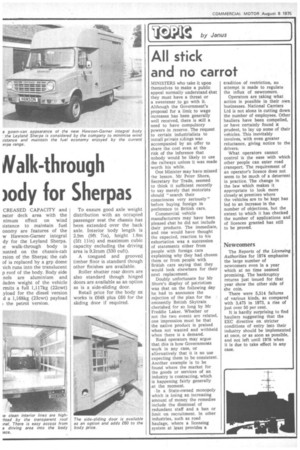All stick and no carrot
Page 28

If you've noticed an error in this article please click here to report it so we can fix it.
MINISTERS who take it upon themselves to make a public appeal normally understand that they must have a threat or
• a sweetener to go with it. Although the Government's proposal for a limit to wage increases has been generally well received, there is still a need to have compulsory powers in reserve. The request to certain industrialists to install private sidings was accompanied by an offer to share the cost even at the risk of the inference that nobody would be likely to use the railways unless it was made worth his while.
One Minister may have missed the lesson. Mr Peter Shore, Secretary for Trade, seemed to think it sufficient recently to say merely that motorists should " search their consciences very seriously" before buying foreign in preference to British cars.
Commercial vehicle manufacturers may have been pleased that he did not include their products. The immediate, and one would have thought the expected, reaction to his exhortation was a succession of statements either from people with foreign cars explaining why they had chosen them or from people with British cars saying that they would look elsewhere for their next replacement.
Doubly unfortunate for Mr Shore's display of patriotism was that on the following day he had to announce the rejection of the plan for the eminently British Skytrain cherished for so long by Mr Freddie Laker. Whether or not the two events are related, one impression must •be that the native product is praised when not wanted and withheld when there is a demand.
Road operators may argue that this is how Governments work in any case, or alternatively that it is no use expecting them to be consistent. Another example is to be found where the market for the goods or services of an industry is contracting, which is happening fairly generally at the moment.
In a State-owned monopoly which is losing an increasing amount of money the remedies include the dismissal of redundant staff and a ban or limit on recruitment. In other industries, such as road haulage, where a licensing system at least provides a tradition of restriction, no attempt is made to regulate the influx of newcomers.
Operators are taking what action is possible in their own businesses. National Carriers Ltd is not alone in cutting down the number of employees. Other hauliers have been compelled, or have certainly found it prudent, to lay up some of their vehicles. This inevitably involves, with even greater reluctance, giving notice to the drivers.
What operators cannot control is the ease with which other people can enter road transport. The requirement of an operator's licence does not seem to be much of a deterrent in practice. The change in the law which makes it appropriate to look more closely at premises where the vehicles are to be kept has led to an increase in the number of objections, but the extent to which it has checked the number of applications and of licences granted has still to be proved.
Newcomers
The Reports of the Licensing Authorities for 1974 emphasise the large number of newcomers even in a year which at no time seemed promising. The bankruptcy returns just issued for that year show the other side of the coin.
There were 5,314 failures of various kinds, as compared with 3,475 in 1973, a rise of just over 50 per cent.
It is hardly surprising to find hauliers suggesting that the EEC directive on stricter conditions of entry into their industry should be implemented at once, or as soon as possible, and not left until 1978 when it is due to take effect in any case.




































































































